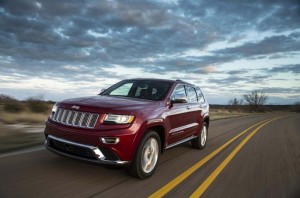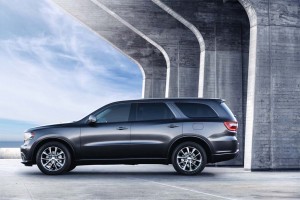
Jeep calls back its latest-model Grand Cherokee due to potential brake problems - especially in colder climates.
The U.S. side of Fiat Chrysler Automobiles plans to recall nearly 900,000 recent sport-utility vehicles because of potential brake problems that could become especially severe in colder climates.
The automaker originally said it didn’t see a recall-worthy problem when it notified federal regulators of a possible issue with brake line corrosion last year, but the National Highway Traffic Safety Administration thought otherwise after learning that the problem can be worsened if the vehicles are operated in sub-freezing conditions.
The recall involves 2011 through 2014 Jeep Grand Cherokee and Dodge Durango SUVs, 644,354 of them sold in the U.S., 42,380 in Canada, and another 181,061 delivered to customers in Mexico and other parts of the world.
The problem was first reported in 2013 by a customer who noticed his brake pedal had become excessively firm, an issue that could result in loss of brake performance. The problem was linked to small crimp joints used with the vehicles’ power brake boosters – which can corrode and allow water to enter the brake line.
Under normal conditions, Chrysler said that shouldn’t have any impact on brake behavior. But a further study revealed that if the water freezes – as could happen in a winter like much of the country just experienced – brake performance could be compromised.
Chrysler plans to notify owners of the recalled vehicles in the coming weeks and will make repairs free of charge, installing a shield around the booster to protect the crimp joints from water.
The maker says it knows of one crash but no injuries related to the problem.
(Toyota recalls Avalon sedan for airbag problem. Click Here for the story.)
Observers say NHTSA’s decision to order repairs underscores the way the automotive recall process is supposed to work and comes in sharp contrast to the ongoing scandal surrounding the repeatedly expanded recall of General Motors vehicles for an ignition switch defect.
While GM CEO Mary Barra admitted this week that the maker handled the problem “poorly,” critics have been questioning why NHTSA failed to take action on its own considering that there are now 13 deaths linked to the problem.
(GM’s Barra vows action during Congressional testimony. Click Here for the latest.)
A 2001 revision of federal motor vehicle safety rules was intended to ensure that safety regulators had all relevant data on potential vehicle defects but during his own testimony before a Congressional subcommittee on Tuesday, NHTSA Acting Administrator David Friedman argued that GM had failed to provide adequate information to the agency, despite the requirements of the so-called TREAD Act.
(GM studying “options” for ignition switch victims’ fund. Click Here for the full story.)

